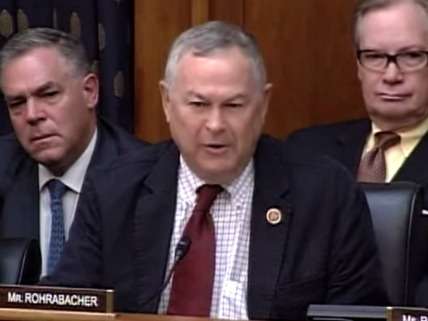House Rules Committee Blocks Amendment Protecting Medical Marijuana
The rider could still be renewed if a conference committee decides to put it in the final bill.

Yesterday the House Rules Committee blocked a floor vote on an amendment barring the Justice Department from interfering with state laws allowing medical use of marijuana. The amendment, which was first enacted in 2014 and has been renewed twice since then, could still be included in the final spending bill, since it has been approved by the Senate Appropriations Committee. Any differences between the House and Senate versions of the bill will be worked out by a bicameral conference committee.
"By blocking our amendment, Committee leadership is putting at risk the millions of patients who rely on medical marijuana for treatment, as well as the clinics and businesses that support them," said the amendment's current sponsors, Reps. Dana Rohrabacher (R-Calif.) and Earl Blumenauer (D-Ore.). "This decision goes against the will of the American people, who overwhelmingly oppose federal interference with state marijuana laws. These critical protections are supported by a majority of our colleagues on both sides of the aisle. There's no question: If a vote were allowed, our amendment would pass on the House floor, as it has several times before."
Attorney General Jeff Sessions urged Congress to block the Rohrabacher-Bluemnauer amendment last May, arguing that "it would be unwise to restrict the discretion of the Department to fund particular prosecutions, particularly in the midst of an historic drug epidemic and potentially long-term uptick in violent crime." Exactly what medical marijuana had to do with any of that was unclear, but the Justice Department generally opposes limits on its prosecutorial discretion, and Sessions' anti-pot prejudices are well-known.
In a Washington Post op-ed piece this week, Rohrabacher rebutted Sessions' clumsy attempt to blame medical marijuana for recent increases in opioid use and opioid-related deaths. To the contrary, he said, marijuana is a safer alternative to opioids. "The drug-war apparatus will not give ground without a fight," he wrote, "even if it deprives Americans of medical alternatives and inadvertently creates more dependency on opioids. When its existence depends on asset seizures and other affronts to our Constitution, why should anti-medical-marijuana forces care if they've contributed inadvertently to a vast market, both legal and illegal, for opioids?"
Unlike Sessions, Donald Trump has repeatedly said he supports medical marijuana and thinks states should be free to allow it. So even if the Rohrabacher-Blumenauer amendment is not renewed for the next fiscal year, it is not clear that Sessions will try to shut down state-licensed medical marijuana suppliers. The amendment does not cover state-legal marijuana merchants serving the recreational market, who nevertheless have escaped prosecution so far, even though they are openly committing federal felonies every day.
A cannabis crackdown would not be popular. In the most recent Quinnipiac University poll, 61 percent of registered voters said marijuana should be legal for recreational use, while a whopping 94 percent said medical use should be allowed. Seventy-five percent opposed enforcement of the federal ban in states that have legalized marijuana for either purpose.
"When an overwhelming majority of Americans oppose federal interference in state medical marijuana programs, it is unconscionable not to let their representatives vote on whether to continue this policy," said Don Murphy, director of conservative outreach at the Marijuana Policy Project. "Unless Congress chooses the Senate budget version, millions of seriously ill patients and the legitimate businesses that provide them with safe access to their medicine will be at risk of prosecution. This vote is a slap in the face of patients, their families, their elected representatives, and the 10th Amendment."


Show Comments (12)